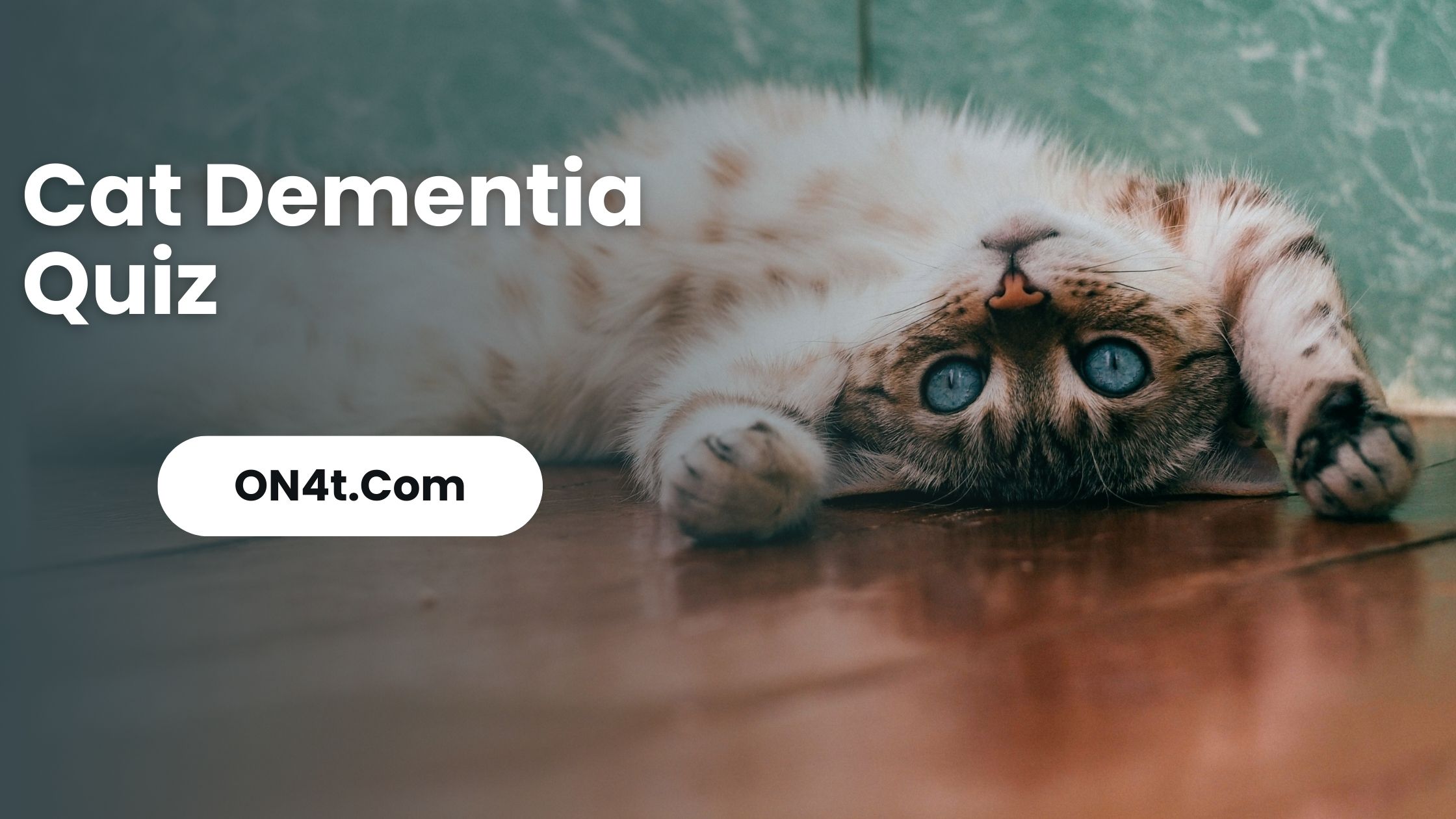As our feline companions age, they may experience cognitive changes similar to dementia in humans. Cat dementia, also known as feline cognitive dysfunction syndrome (FCDS), is a condition that affects memory, learning, and behavior in senior cats. Many cat owners wonder if their aging cat’s behavioral changes could be signs of dementia.
This article provides a brief Cat Dementia quiz with multiple choice questions (MCQs) to help you identify potential signs of cat dementia. Please keep in mind that online quizzes are not a replacement for a professional evaluation by a veterinarian. If you suspect your senior cat may have dementia, it’s important to consult with your vet for an accurate diagnosis and appropriate management plan.
What are Signs of Cat Dementia?
Cat dementia, or feline cognitive dysfunction, affects many aging cats. Common signs include increased confusion, changes in sleep patterns, and altered social behavior. For instance, a cat might meow more at night or forget the location of its litter box.
Owners might notice their cats staring into space or failing to recognize familiar spaces and faces. These symptoms can indicate a decline in mental functions, making it hard for cats to navigate their daily routines.
It’s important to monitor these changes and consult a vet for a proper diagnosis. Early detection can help manage the condition, ensuring a better quality of life for your furry friend.
Understanding Age-Related Changes: Cat Dementia Quiz Insights
As cats age, they may show signs of cognitive decline, a condition similar to dementia in humans. Studies indicate that around 28% of cats aged 11 to 14 exhibit these symptoms.

The likelihood of developing these symptoms increases with age. For cats that are 15 years or older, the percentage experiencing cognitive issues rises to over 50%. This shows a clear trend that as cats grow older, the risk of dementia increases.
Taking a ‘cat dementia quiz’ can help you identify early signs of cognitive decline in your aging pet, ensuring they receive the care they need.
Symptom Observation For Cat Dementia
Cats with dementia might seem lost, even in familiar places. Studies say that over 40% of cats with cognitive issues show signs of disorientation. This can make them appear confused about their surroundings.
Sleep patterns also change. About 30% of these cats have trouble with their sleep-wake cycles, meaning they may be active at night and sleep more during the day. It’s a clear shift from their usual habits.
Taking a cat dementia quiz can help you spot these signs early. Recognizing them quickly may help manage your cat’s condition better.
Sample Cat Dementia Quiz Questions
Has your cat started missing the litter box or going to the bathroom in unusual places?
a) Yes
b) No
Answer: If yes, this can be a sign of cat dementia, as cognitive decline may affect your cat’s memory of where the litter box is located.
Does your cat seem to get lost in corners of your home or behind furniture?
a) Yes
b) No
Answer: Yes can indicate spatial confusion, a common symptom in cats experiencing cognitive dysfunction.
Have you noticed your cat staring at walls or into space more frequently than usual?
a) Yes
b) No
Answer: A ‘Yes’ response could suggest your cat is experiencing disorientation, a symptom associated with dementia in cats.
Is your cat less interested in playing with toys or interacting with family members than before?
a) Yes
b) No
Answer: Decreased interest in play or social interactions can be a sign of declining cognitive function in cats.
Has your cat’s sleeping pattern changed, such as sleeping more during the day and being restless at night?
a) Yes
b) No
Answer: Yes indicates a disruption in normal sleep-wake cycles, often seen in cats with dementia.
FAQs
What Causes Cat Dementia?
The exact cause of cat dementia, or feline cognitive dysfunction syndrome (FCDS), is not fully understood. However, it is believed to be related to age-related changes in the brain, such as the accumulation of beta-amyloid plaques, which are also associated with Alzheimer’s disease in humans. Other factors that may contribute to cognitive decline in cats include oxidative stress, inflammation, and vascular changes in the brain.
At What Age Do Cats Typically Develop Dementia?
Cats generally start showing signs of cognitive decline around 11 to 12 years of age, but it can occur earlier or later depending on the individual cat. The risk of developing cat dementia increases with age, and it is estimated that about 50% of cats over the age of 15 show some signs of cognitive dysfunction.
Is Cat Dementia Treatable?
While there is no cure for cat dementia, there are several management strategies that can help slow the progression of the disease and improve your cat’s quality of life. These may include: Environmental enrichment: Providing mental stimulation through interactive toys, puzzle feeders, and regular playtime can help keep your cat’s mind active. Diet and supplements: Your veterinarian may recommend a special diet or supplements that support brain health, such as antioxidants, omega-3 fatty acids, and probiotics.
How Can I Support My Cat With Dementia?
If your cat is diagnosed with dementia, there are several ways you can support them: Maintain a consistent routine: Stick to a regular schedule for feeding, playtime, and grooming to help reduce confusion and anxiety. Make necessary environmental adaptations: Ensure your cat has easy access to litter boxes, food, and water, and create a safe, comfortable space for them to rest.Be patient and understanding: Remember that your cat’s behavioral changes are due to a medical condition and not deliberate misbehavior.
Conclusion
Taking the cat dementia quiz can offer insights into your cat’s cognitive health, but it’s essential to follow up with a vet for a definitive diagnosis. The quiz is a starting point, not a substitute for professional advice.
Ready to make your quiz results or any text stand out? Try the On4t fancy font generator to transform your words into eye-catching, attractive fonts perfect for social media. Make your fonts fancy with On4t.